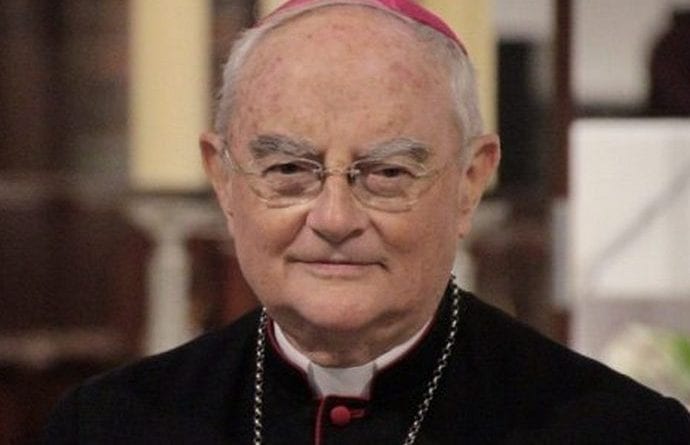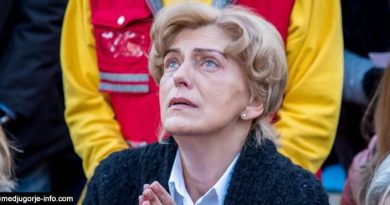Papal Envoy in Ireland with Pope…”The crisis of the family is devastating…That’s why so many families come to Medjugorje.”
The crisis of the family is devastating, we need to go back to the origin, to God’s project, to the model of the Holy Family. That’s why so many families come to Medjugorje. These are the words of archbishop Henryk Hoser, Permanent Apostolic Visitor to the parish of Medjugorje, at the vigil of the World Meeting of Families in Dublin.
«In these times of terrible crisis for the family, it is crucial to go back to the roots, to God’s project, to the model of the Holy Family: this is the reason why so many families come to Medjugorje». These are the words of Monsignor Henryk Hoser, the Polish archbishop appointed by Pope Francis on 31 May as Permanent Apostolic Visitor to the parish of Medjugorje. His task is exclusively pastoral, but it highlights the concern the Holy See has for the care of millions of pilgrims who come to this small town in Herzegovina where it is believed Our Lady has been appearing for the last 37 years. Monsignor Hoser carries out his task in close contact with local priests and the pilgrims.
Every morning he celebrates mass in Croatian at 7.30 in the church of St. James and it was at the end of the mass that we went to greet him. Wary at the beginning, when I tell him I’m a journalist (“I’m not going to talk about Medjugorje”, his hands raised), he becomes immediately available when I ask him to talk about the theme of the family. We continue our conversation in a room in the parish house. It’s a spacious but spartan room, with only two tables and some chairs; it provides a quiet place to share a moment together.
Monsignor Hoser, one of the most striking things about Medjugorje is precisely the large number of united families who come here on pilgrimage. At the same time, thoughts of Dublin immediately come to mind, where in the next few days the World Meeting of Families will take place, a triennial event initiated by St. John Paul II in 1994. Even if there is no official convocation, many families come to Medjugorje spontaneously. What’s the reason for this?
They come because they find the roots of the family here. The Marian cult that takes place in Medjugorje is based on the figure of Mother Mary who takes care of families. Without even making the family a topic, people come here to listen and learn not only about the vocation, but also about the mission of the family in the world. They learn how to live their vocation in a historical moment when the crisis of families is at its worst. A few days ago, I was shocked to discover that according to Eurostat data, 70% of children in Ireland are born out of wedlock. 70%! It’s incredible if one recalls a certain picture of Catholic Ireland.
You see, it’s the children who are the first victims of this crisis.
It’s absolutely abominable. The phenomenon of pedophilia stands out above everything else and apart from the priests, it is also prevalent in civil society. It is the sanctity and sacredness of children that is being violated so terribly. The Lord says very clearly what the gravity of this sin is and it is also the worst sin that dominates today’s society. It is the clearest sign that the bond with God has been broken. Today, it is evident that society lives only in a horizontal dimension which means without orientation and without direction. The only common denominator seems to be economy, self interest and selfish self-sufficiency
If in such a dramatic situation so many families come to Medjugorje, it must mean there is a message here which is also valid for those who will meet in Dublin in the next few days. What is it?
We need to propose the model of the Holy Family again, to meditate on the factors which constitute a healthy and holy family life. Starting from the motherhood of the mother of God who is also our mother and the Queen of Peace. We must begin with inner peace, peace in our heart, “open your heart to God”. Here lies the crux of the matter. The division between couples is born precisely from the division of the heart, we accuse one another and then take a distance from each other. The same thing is happening in society today: everyone blames everyone else, it is the work of the devil, he is the master of accusation and division. Let us remember the beginning: Adam accuses Eve and together they accuse God. Behold, Our Lady, Queen of Peace, she is the one who helps us to rebuild unity in our heart, and then unity with others, in the family, in society, in international relations. Without this maternal figure we built the Tower of Babel with great economic and technological effort, but we ended up lost and dispersed. Cardinal Lustiger said that the counterbalance to the Tower of Babel is Pentecost, when the Holy Spirit descended and everyone understood what St. Peter said in their own language.
What about the role of Joseph in the Holy Family…
He is a very important figure for today’s society; the French Revolution killed the figure of the father, the fatherhood of God the Father. Joseph is entrusted with the responsibility of woman and child. This is the reason the archangel addressed Joseph: “Take your wife and child and go to Egypt”, and later he will have to take them both back to Nazareth. This is his responsibility. He is also entrusted with the responsibility to protect Our Lady during her pregnancy and he becomes a witness to the birth of Jesus. For many years he is the educator of Jesus’ humanity. It is not without reason that in the canon of the mass Saint Joseph is mentioned before the apostles.
And the Son …
The most moving moment is the episode of Jesus at 12 years old, when his parents are looking for him and Our Lady says “Your father and I were so worried, we looked for you in anguish”, and the Son affirms His perspective of life which is to do the will of the Father. This immediately becomes Mary’s and Joseph’s perspective as they discover Jesus not only to be the son of man but also the Son of God
St. John Paul II firmly believed that the final battle between God and the devil would be over the family. For this reason he wanted to create a Pontifical Council for the Family, an Institute of Studies on the Family and also these World Meetings. Do you agree that this awareness has faded in the Church today?
Definitely. But above all, we have lost our awareness of the beginning, of God’s project for creation. Jesus always refers to the beginning in his discussions with the Pharisees, for example when he was questioned about divorce. We are back at the same point again: the breaking of the covenant with God which prevents us from having a synthetic understanding of reality. Everything is fragmented, like a mosaic with loose tiles out of place. This is the problem for families today: to live its existential, ontological, metaphysical essence. We need to repair all this, that’s why the faithful are drawn to the great Marian shrines: through the humanity of Mary and Jesus we rediscover God’s plan.
Are these world meetings really useful? Many have serious doubts about it.
The real problem is that the work at the base of the Church is dramatically missing. What happens in the parishes, in the individual communities, is more important than what is achieved in a congress, because everyone goes to congresses already convinced. There are so many congresses in the world where we talk about family, bioethics, natural methods, but at parish level very little is done. This is tragic, even priests are not always well trained in pastoral care for the family. It is not just a matter of having brilliant psychological ideas, of teaching dialogue. One has to understand the spirituality of the family, and also the family somatic, that is, the body. I am a doctor, trained in bioethics, I know what the biology of the couple entails, it is not secondary, it is very important in a relationship.
The meeting in Dublin coincides with the shocking news of the sexual abuse by priests and even bishops over a sustained period of time. There is also controversy that the World Meeting of Families is hosting personalities who push for the promotion of the LGBT agenda in the Church.
This story about priests who have committed sexual abuse is a huge scandal. Those who have committed these acts must be immediately defrocked, they must be promptly removed from the ministry.
There are some who try to instrumentalise it to “normalize” homosexuality.
This cannot be accepted by the Church. Unfortunately, there are bishops who play on this, they say a little ‘yes’ and a little ‘no’. They justify it by saying after all God created them like that. But this is not true, God did create the man only male and female. The Church can never accept this idea, we must fight against it. I have spoken very clearly against gender ideology on many occasions. The main victims are young people partly because all the media are eroticised: the advertisements, the internet, they are all full of eroticism. The terrible belief that everyone must practice sex, all without exception because it’s good for you, it works against depression, and so on. Sex has been reduced to sporting and hygienic activity. Young people are not educated in chastity, and this is a catastrophe: without self control, fidelity is impossible. And fidelity is the yardstick of true love.
Too often, when the clergy comes face to face with this situation, instead of announcing the truth they take refuge in being “politically correct”. Families can’t find a point of reference or get any help. What should an ordinary family do when they look for guidance?
It is true, we are in the desert. So we must turn to God, because only He can intervene. My episcopal motto is “God is greater”: we must pray to God to intervene in this situation. The 19th and 20th century apparitions are clearly an example of Divine intervention, especially Fatima. I like to reflect on the life of Moses: he lived 120 years altogether, that is to say three times 40. Forty, as we know, is a symbolic number. It does not indicate time chronologically but the kairos, the time of the accomplishment of something. The first 40 years of Moses were spent in education: Moses attended Pharaoh’s school, he learned science, art and more. In the second forty years he became a revolutionary, he wanted to put his own ideas to good use and he wanted to change the world: a revolutionary. That is why he lost everything. At this point God intervenes, he encounters God in the burning bush and the last 40 years of his life are spent in mission led by God. Today we are in the same situation as Moses at the end of his second 40 years, we are in the desert. We must invoke God’s intervention.
(Translation by Patricia Gooding-Williams)




